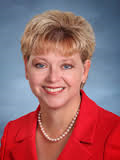Some of Florida’s top policymakers have for the past few years been looking for ways to attract more high-performing charter school operators to the state’s inner cities. But apart from KIPP Jacksonville and a few newcomers like the SEED School of Miami, they have few high-profile efforts to point to. And attempts to change state law to help recruit well-regarded operators have faltered in the Legislature.

Now one of the top state lawmakers on education policy, Rep. Janet Adkins, R-Fernandina Beach, says she wants lawmakers to try a different approach next year.
The state creates special provisions for charter schools designated “high-performing.” Why not do something similar for charters that want to open in “high-needs” areas, helping them with issues from accountability to financing for their buildings?
“We need to have a whole new set of criteria,” said Adkins, who currently chairs the House subcommittee dealing with K-12 policy. “I’m envisioning a whole new set of statutes dealing with high needs.”
The idea came up during a recent gathering of charter school and district officials in Fort Lauderdale. Richard Moreno, who works with organizations that provide financing and other business services to charter schools, said one major barrier keeping organizations like KIPP and Uncommon Schools from Florida is the state’s stringent “double-F” rule.
State law requires most charter schools that earn F’s two years in a row to close. As a result, Moreno said, philanthropists and well-known charter organizations run a risk that they could sink resources into an area with high need, only to see their school shut down a few years later. “They’re not touching Florida because of this,” he said.
Adkins said she wants the state to emphasize learning gains when holding these new high-needs schools accountable so they aren’t penalized for taking on low-proficiency students and/or ensnared by the double F rule. But right now, she said, proposals are in the “idea stage” and details would still need to be worked out.
Robert Runcie, the schools superintendent in Broward County, said he could envision school districts and other community groups vetting competing proposals from charter operators looking to move into struggling schools, creating “a very structured way of bringing a high-quality solution into a community.”
Some districts have existing classroom space, he said, so it might make sense for them to work with charter operators to revitalize existing schools or facilities, rather than coming up with new ways to finance new school construction.
“We’ve got to replace low-performing seats with high-performing operators,” he said. “That’s the only logical thing to do. Otherwise we’re wasting taxpayer money.”
The school district officials who took part in Wednesday’s meeting are, by definition, open to collaboration with charter schools. That’s not always the case for their counterparts elsewhere.
Adkins said she wants the process she’s contemplating to also be available to philanthropists and community people in those districts as well.



Alright, let us start with using new words for this subject.
1st, Public Education Partner instead of, u know, the C word.
2nd High needs or low needs makes no difference.
3rd Accountability and of course the PEPs need to bring lots of dead presidents,
( DO NOT COME IN TO A SCHOOL DISTRICT TO TAKE MONEY OUT OF
AN ALREADY SHORT BUDGET)
4th Complete open books by PEPs for our elected school boards and our School District
CEOs (school superintended, director of education) to inspect without notice.
5th Elected school boards and CEOs (or assigned staff) must be able to go sit in on
any class rooms to observed what is being taught without notice. This is the only
acceptable way to make sure all Education Laws are being followed.
6th No Drop Policy. All PEPs must abide by a No Drop Policy set up by School District.
If a child is having a tough time learning, do not try to push them out because it
hurts your over all performance rating.
7th Same dress code as district, unless Elected School Board or CEO approves one.
8th All teachers must be approved by CEO or assigned staff and under go proper
background check.
9th All Administrations and PEPs owners salaries must be transparent and APPROVED
by Elected School Board.
10th All taxpayer money used for building purchase or lease must be deposited into
School District Accounts. School District must keep all properties in School District
name on Title or Lease. PEPs can choose location.
Now lets get to teaching and bring our great State of Florida to the best in the world !
Thanks for all the suggestions, but I’m not convinced that many of these rules will make education any better. For example, what is the point of requiring all schools to have the exact same dress code? Sameness does not lead to a better education. The point of charters, and choice, is to allow people to have access to different types and methods of education.
There is no dress code. Some charters like to have a dress code. Charters and choice does not mean spend tax dollars with no accountability. These rules will protect tax payer money. Ok with choice as long as Education Laws of Florida are followed. Let us keep it simple, take the Florida Tax payers money, follow the law. Complete transparency for all to see. One word answer is ” Accountability” for all money and education. We the residents of Florida elect people to watch the money.